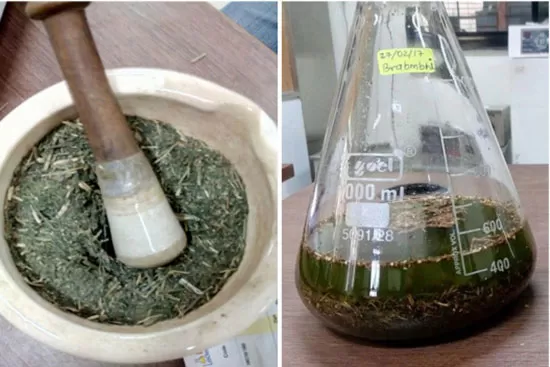- 0086-571-85302990
- sales@greenskybio.com
Unlocking the Power of Beta-Sitosterol: A Comprehensive Guide to Plant Sources
2024-08-23
Introduction
Beta-sitosterol is a phytosterol that has gained significant attention in recent years for its potential health benefits. This comprehensive guide aims to explore the power of beta-sitosterol and delve into the various plant sources from which it can be obtained. By understanding the sources and benefits of beta-sitosterol, individuals can make informed decisions about incorporating it into their diets.
What is Beta-Sitosterol?
Beta-sitosterol is a natural compound found in plants. It belongs to the class of phytosterols, which are structurally similar to cholesterol but have different biological activities. Beta-sitosterol is known for its anti-inflammatory, antioxidant, and cholesterol-lowering properties. It has been studied for its potential role in reducing the risk of cardiovascular diseases, prostate problems, and other health conditions.
Benefits of Beta-Sitosterol
Cardiovascular Health
One of the key benefits of beta-sitosterol is its ability to support cardiovascular health. Studies have shown that beta-sitosterol can help reduce LDL cholesterol (the "bad" cholesterol) and increase HDL cholesterol (the "good" cholesterol). By improving cholesterol levels, beta-sitosterol may reduce the risk of heart disease and stroke.
- Reduces LDL cholesterol: Beta-sitosterol binds to cholesterol in the digestive tract and prevents its absorption into the bloodstream. This leads to a decrease in LDL cholesterol levels.
- Increases HDL cholesterol: Beta-sitosterol may also help increase HDL cholesterol levels, which helps remove excess cholesterol from the arteries and reduces the risk of plaque formation.
Prostate Health
Another area where beta-sitosterol shows promise is in prostate health. Some studies suggest that beta-sitosterol may help reduce the size of an enlarged prostate and relieve symptoms such as urinary difficulties. It is believed to work by inhibiting the growth of prostate cells and reducing inflammation in the prostate gland.
- Reduces prostate size: Beta-sitosterol may help shrink an enlarged prostate, improving urinary flow and reducing symptoms such as frequent urination, urgency, and difficulty in starting urination.
- Relieves inflammation: The anti-inflammatory properties of beta-sitosterol can help reduce inflammation in the prostate gland, which is often associated with prostate problems.
Anti-Inflammatory Effects
Chronic inflammation is linked to various health conditions, including cardiovascular disease, diabetes, and arthritis. Beta-sitosterol has been found to have anti-inflammatory properties, which can help reduce inflammation in the body and potentially lower the risk of these diseases.
- Suppresses inflammatory markers: Beta-sitosterol can inhibit the production of inflammatory cytokines and other markers of inflammation, helping to keep the body in a state of low inflammation.
- Protects against oxidative stress: In addition to its anti-inflammatory effects, beta-sitosterol also has antioxidant properties. It can scavenge free radicals and protect cells from oxidative damage, which is another contributing factor to inflammation.
Plant Sources of Beta-Sitosterol
Vegetables
Many vegetables are rich in beta-sitosterol. Some of the notable sources include:
- Broccoli: Broccoli is a cruciferous vegetable that is high in beta-sitosterol. It also contains other beneficial compounds such as sulforaphane and vitamin C, which further enhance its health benefits.
- Brussels sprouts: These small, cabbage-like vegetables are another excellent source of beta-sitosterol. They are also rich in fiber and vitamins, making them a nutritious addition to the diet.
- Spinach: Spinach is a leafy green vegetable that is packed with nutrients, including beta-sitosterol. It is a great source of vitamins A, C, and K, as well as iron and calcium.
Fruits
Fruits also contain beta-sitosterol, although in lower amounts compared to vegetables. Some fruits that are good sources of beta-sitosterol include:
- Apples: Apples are a popular fruit that is rich in beta-sitosterol. They also contain fiber and antioxidants, which can help promote overall health.
- Oranges: Oranges are a good source of vitamin C and beta-sitosterol. The bioflavonoids in oranges also enhance their antioxidant activity.
- Berries: Berries such as strawberries, blueberries, and raspberries are not only delicious but also contain significant amounts of beta-sitosterol. They are high in antioxidants and have anti-inflammatory properties.
Nuts and Seeds
Nuts and seeds are excellent sources of beta-sitosterol. Some of the top nuts and seeds include:
- Almonds: Almonds are a popular nut that is rich in beta-sitosterol. They are also a good source of healthy fats, protein, and fiber.
- Sunflower seeds: Sunflower seeds are a good source of beta-sitosterol as well as vitamin E and other nutrients. They can be eaten raw, roasted, or used in salads and trail mixes.
- Flaxseeds: Flaxseeds are a unique source of beta-sitosterol as well as omega-3 fatty acids. They can be ground and added to smoothies, yogurt, or baked goods.
Whole Grains
Whole grains are an important part of a healthy diet and also contain beta-sitosterol. Some whole grains that are good sources include:
- Brown rice: Brown rice is a whole grain that is higher in fiber and beta-sitosterol compared to white rice. It is a good source of energy and provides essential nutrients.
- Oats: Oats are a popular whole grain that is rich in beta-sitosterol and soluble fiber. They can help lower cholesterol and promote heart health.
- Barley: Barley is another whole grain that contains beta-sitosterol. It is a good source of fiber and can help regulate blood sugar levels.
How to Incorporate Beta-Sitosterol into Your Diet
Incorporating beta-sitosterol into your diet can be done through various means. Here are some suggestions:
Add Vegetables to Your Meals
Increase your intake of vegetables such as broccoli, Brussels sprouts, and spinach. You can eat them raw in salads, steam them, or add them to stir-fries and soups. Aim to include a variety of vegetables in your diet to ensure you get a wide range of nutrients.
Include Fruits in Your Snacks
Choose fruits like apples, oranges, and berries as snacks instead of processed snacks. They are not only delicious but also provide natural sweetness and fiber. You can eat them on their own or add them to yogurt or oatmeal for a more filling snack.
Snack on Nuts and Seeds
Keep a bag of almonds, sunflower seeds, or flaxseeds on hand for a healthy snack. Nuts and seeds are a convenient source of beta-sitosterol and other nutrients. Just be mindful of portion sizes as they are high in calories.
Choose Whole Grains
Replace refined grains with whole grains such as brown rice, oats, and barley. You can use them in place of white bread, pasta, and rice in your meals. Whole grains provide more fiber and nutrients than refined grains.
Use Plant-Based Oils
Include plant-based oils like olive oil and canola oil in your cooking. These oils contain beta-sitosterol and other healthy fats. Use them for sautéing, baking, and dressing salads.
Precautions and Considerations
While beta-sitosterol is generally safe for most people, there are a few precautions to keep in mind:
- Consult a healthcare professional: If you have any underlying health conditions or are taking medications, it is advisable to consult a healthcare professional before adding beta-sitosterol to your diet. They can provide personalized advice based on your specific情况.
- Monitor for allergic reactions: Some people may be allergic to certain plants or plant compounds. If you experience any allergic reactions such as itching, swelling, or difficulty breathing after consuming beta-sitosterol-rich foods, discontinue use and seek medical attention.
- Maintain a balanced diet: Beta-sitosterol is just one component of a healthy diet. It is important to maintain a balanced diet that includes a variety of fruits, vegetables, whole grains, lean proteins, and healthy fats. Do not rely solely on beta-sitosterol for your health.
Conclusion
Beta-sitosterol is a powerful compound found in various plant sources. Its potential health benefits, including cardiovascular support, prostate health, and anti-inflammatory effects, make it an interesting addition to the diet. By incorporating beta-sitosterol-rich foods into your daily routine, you can unlock its power and potentially improve your overall health. However, it is important to consult a healthcare professional and maintain a balanced diet for optimal results.
FAQ:
What is beta-sitosterol?
Beta-sitosterol is a phytosterol with specific properties and benefits.
What are the main plant sources of beta-sitosterol?
Some common plant sources include certain vegetables, nuts, and seeds.
What are the benefits of beta-sitosterol?
It can have multiple benefits such as helping with cholesterol levels and providing antioxidant effects.
How does beta-sitosterol work in the body?
It interacts with the body in various ways to exert its positive effects.
What are some applications of beta-sitosterol?
It can be used in dietary supplements and may have applications in healthcare.
Related literature
- The Role of Beta-Sitosterol in Plant Biology"
- "Exploring the Therapeutic Potential of Beta-Sitosterol from Plant Sources"
- "Plant-Derived Beta-Sitosterol: Insights and Applications"
- ▶ Hesperidin
- ▶ citrus bioflavonoids
- ▶ plant extract
- ▶ lycopene
- ▶ Diosmin
- ▶ Grape seed extract
- ▶ Sea buckthorn Juice Powder
- ▶ Beetroot powder
- ▶ Hops Extract
- ▶ Artichoke Extract
- ▶ Reishi mushroom extract
- ▶ Astaxanthin
- ▶ Green Tea Extract
- ▶ Curcumin Extract
- ▶ Horse Chestnut Extract
- ▶ Other Problems
- ▶ Boswellia Serrata Extract
- ▶ Resveratrol Extract
- ▶ Marigold Extract
- ▶ Grape Leaf Extract
- ▶ blog3
- ▶ blog4
- ▶ blog5
-
What are extracts made of?
2024-08-23
-
Extract Usage: A Comprehensive Guide
2024-08-23
-
Are plant extracts good for you?
2024-08-23
-
What are plant-based extracts?
2024-08-23
-
What Is a Plant Extract? A Deep Dive
2024-08-23
-
Quercetin
2024-08-23
-
Tongkat Ali Extract Powder
2024-08-23
-
Elderberry Extract
2024-08-23
-
Curcumin
2024-08-23
-
Red Wine Extract
2024-08-23
-
Pueraria Lobata Extract
2024-08-23
-
Withania Somnifera Extract
2024-08-23
-
Hawthorn Extract
2024-08-23
-
Cat Claw Extract
2024-08-23
-
Acerola Extract
2024-08-23































